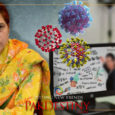
By Sarvat Hossein
Fake news is a major problem. Pakistan is not the only country in the world which has suffered from fake news but recently according to an American survey, half of U.S. adults also get affected by it and the public at large blame politicians and activists for circulating fake news for their personal and professional benefits.
The burning question remains; how should this issue be dealt with? After all, completely made up or misleading stories have embroiled politicians, civil rights and other prominent people.
Breaking fake news on social media sites is not just unethical for journalists but it can create unnecessary stress and panic among members of the public. Inaccurate or false information acquires a tremendous potential to cause real-world impacts in today’s world, given the propensity for the use of social media avenues to facilitate this menace.
Within minutes, for millions of users, fake news can become ‘fact’ and indeed, a real nuisance….
New research suggests that believing or accepting fake news induces considerable stress for some, never mind the effects of heart function as well. One of the leading UK Universities concluded, after a pilot study, that people with low ‘Information discernment’ (or ID) – and who prevent themselves from checking the reliability of information and usually do not question the source, demonstrate unhealthy symptoms of physical as well as mental stress.
While the entire globe Is facing the unprecedented pandemic Covid-19 and whilst we all are in uncharted and uncertain territory, it is a real torment, having to experience the impact of the behaviour of some individuals who deliberately choose to create more panic by uploading the fake videos and news, whilst there is already tremendous amount of trauma in existence due to the so many unprecedented deaths in the world.
Of course, humanity has seen other seismic events but something as novel as this new pandemic cannot be described easily. Not many people, if any at all, have experienced anything like this in their lifetime. The impact, both mental and physical is more than enough for most to contend with.
It is time that people who are looking for reliable information regarding Covid-19 understand that some online content is not reliable or evidence based. News that is factually incorrect is dangerous and can cause emotional trauma to anyone who reads it.
Irresponsible journalism is at rife at the moment. Even reputable mainstream media organisations are busy to creating alarmist and sensational headlines to accumulate as many clicks as possible on their sites, with little regard for the impact on people’s psychological and mental wellbeing.
In this time of tremendous uncertainty, journalists and media organisations should have at least some moral obligations to report to sensible , honest and fact-based journalism, rather sensationalism, and they should confine themselves to the sharing of accurate information with the public. Having said that, the public should also be cautious of the information we read and share via social media platforms. – PakDestiny








Very well written. No doubt pakistani media is surviving mostly on news which has half the teality and ignorant public uploading fake news wherever they like so there should be strict check by organisation so that ppl think before they speak or upload any fake nws.